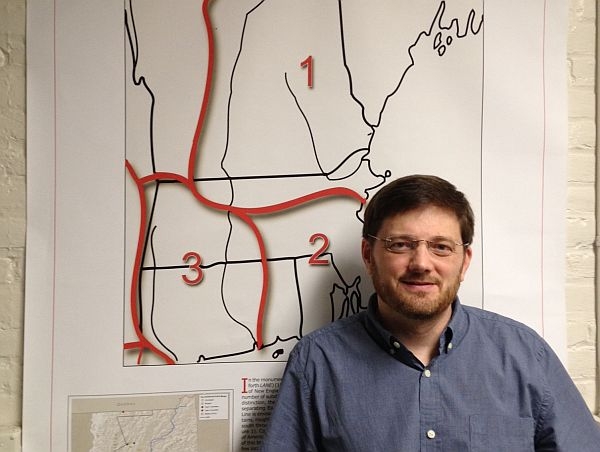Ever noticed how some people "park" their car and others "pahk" it? Or how some people have ideas, and others have idea-rs?
Many speech habits get passed down through generations. But researchers from Dartmouth are finding that linguistic patterns in northern New England are taking surprising twists and turns.
 First, a little history. In colonial America, the Green Mountains were a huge cultural dividing line. To the east, settlers came up from Boston. Their forbears hailed from southeastern England, where, if you wanted to sound aristocratic you dropped the final "r" from a lot of words.
First, a little history. In colonial America, the Green Mountains were a huge cultural dividing line. To the east, settlers came up from Boston. Their forbears hailed from southeastern England, where, if you wanted to sound aristocratic you dropped the final "r" from a lot of words.
West of the mountains, settlers from New York pronounced their r’s much more decidedly. At least they did in the 1930’s. Linguists called it "the founder effect." But Dartmouth linguistics professor James Stanford, his colleague, Thomas A. Leddy-Cecere, his student Kenny Baclawski, have been wondering if that effect still holds today, and if so, where.
So they have been collecting dialects from the Upper Valley.
Stanford says the recordings show that the Green Mountains are no longer the sharpest dividing line between eastern and western New England speech patterns. Since the 1930s, he says, it’s moved east-to the state line.
"So that nowadays locals talk about the air being different when you cross over the Connecticut River," said Stanford. "And part of that may be an unconscious sense of linguistic differences, but then also a sense of state identity that’s also playing a role."
In other words, old-time Vermonters don’t want to sound like their neighbors in New Hampshire-and vice versa. But that’s not necessarily true for their children. For the most part, the younger generation doesn’t say "bawth," and they say "idea," not "idear." And that generation gap exists on either side of the Connecticut River.
Case in point: Kenny Baclawksi, a 22-year old Dartmouth grad who was Stanford’s student. Baclawski guesses that teen-agers who drop their parents’ accents are priming themselves to leave home-and others who cling to older dialects are planning to stick around. He belongs to the former group. For example, when he left Boston for college in Hanover, he says his speech got stirred into a big melting pot.
"And all these people from across the country come over and study together and all these different dialects come together and we all sort of merge and we all start talking this academic English…it doesn’t really sound like anything…Definitely, the way I speak is very boring, " said Baclawski, using near-perfect, unaccented enunciation.
So those cross-influences that Baclawski is describing on his college campus mirror what’s happening in the larger region covered by the study he’s worked on with his professor.
Professor Stanford says the Connecticut River used to be a watery highway. But now it acts more like a boundary. And the paved highways-interstates 91 and 89-are bringing speakers north into the Upper (or Uppah?) Valley who are changing the way the place sounds.